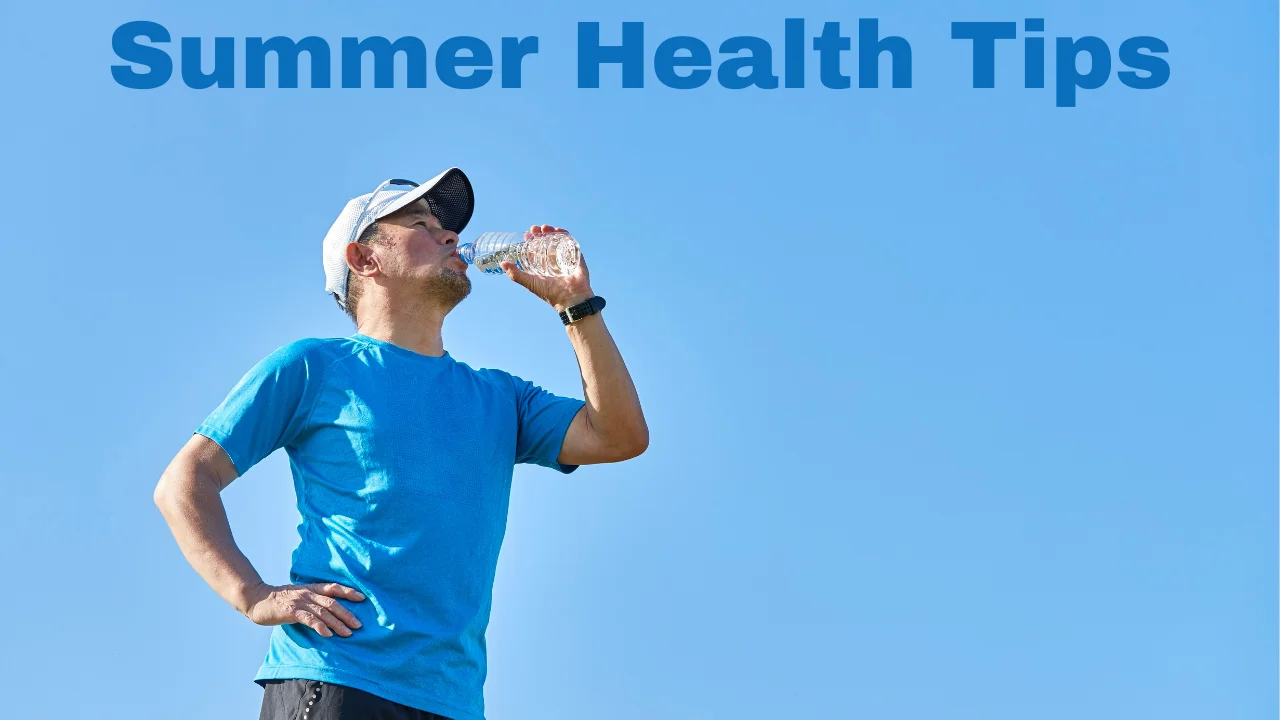Summer Health Tips Protect Your Body From Heat and Illness

Summer brings warmth, sunshine, and energy, but it also brings challenges for the human body. When the temperature rises, people face risks like dehydration, sunburn, and foodborne illness. That is why summer health tips are important for every age group. Many experts explain in resources like determinants of health ppt that environment and lifestyle shape health outcomes. The heat of summer can stress your body if you do not prepare properly.
This article will give you a complete guide to surviving hot months with comfort. You will learn how to eat, drink, rest, and protect yourself in ways that boost energy and prevent illness. By following these strategies, you can enjoy sunny days without falling sick.
What Are Summer Health Tips?
If you search for summer health tips, you will find guidance to protect your body from heat, sun, insects, and illness. These tips are not just suggestions—they are essentials for staying well when the weather is hot and strong. Early in life we might learn many health rules, and even things like determinants of health ppt show how environment, behavior, and age all affect wellbeing in summer.
These guidelines help everyone—children, adults, older people—feel better, avoid disease, and enjoy outdoor time. Summer brings longer days, more sun exposure, and higher temperatures. Without good habits, people may suffer from dehydration, heat stroke, skin damage, or even infections. Understanding health tips helps reduce these risks.
Understanding the Common Summer Health Risks
Summer has several health threats that are easy to overlook. When you know them, you can avoid bigger problems later.
| Risk Factor | Possible Outcome | Prevention Strategy |
|---|---|---|
| Heat and humidity | Heat exhaustion, heat stroke | Stay hydrated, rest in shade, wear light clothes |
| UV rays | Sunburn, skin damage, eye strain | Use sunscreen, sunglasses, hats, avoid midday sun |
| Dehydration | Fatigue, cramps, kidney strain | Drink water, eat fruits with high water content |
| Food spoilage | Stomach upset, diarrhea, food poisoning | Store food properly, eat fresh, wash hands |
| Insects | Bites, rashes, disease spread | Use repellents, wear long clothes, check for ticks |
By understanding these risks, you can follow effective health tips and reduce danger to your body.
Hydration: The Most Important Summer Habit
One of the most important health tips is staying hydrated. Water helps regulate body temperature and keeps organs working. Drink before you feel thirsty, because thirst is already a sign of dehydration.
Add water-rich foods like watermelon, cucumber, and oranges to your meals. These foods cool your body and replace lost fluids. Avoid alcohol and sodas because they remove water from your body. If you exercise outdoors, carry a bottle with electrolytes to replace lost salts.
Sun Safety: Protecting Your Skin and Eyes
Sunlight is healthy in small amounts, but too much causes damage. Skin can burn within 15 minutes in direct summer sun. Use sunscreen of SPF 30 or higher and apply it on all exposed skin. Reapply every two hours and after swimming or sweating.
Wear hats with wide brims and sunglasses that block UVA and UVB rays. These protect both skin and eyes from harmful effects. Staying in shade during peak hours between 10 a.m. and 4 p.m. is another simple yet powerful way to follow health tips.
Cooling the Body: Managing Heat at Home and Outside
The body overheats quickly in high temperatures. Staying cool is not just for comfort but also for safety. Spend time in air-conditioned rooms during heat waves. If you do not have AC, use fans, open windows at night, and close curtains during the day.
Avoid physical activity in the hottest part of the day. If you must work outside, take breaks, drink water, and wear light-colored clothing. Apply cool cloths to your neck and arms when you feel too hot. Recognizing early signs of heat stress is critical.
Nutrition in Summer: Eat Fresh and Light
Food choices also play a big role in summer health tips. Heavy and oily meals make the body feel sluggish in heat. Instead, focus on light meals with fresh vegetables, lean proteins, and seasonal fruits.
| Summer Food | Benefit |
|---|---|
| Watermelon | High water content, vitamins A and C |
| Cucumber | Cooling, rich in fiber, good for hydration |
| Mango | Boosts immunity, provides natural sugars |
| Leafy greens | Rich in iron and calcium, easy to digest |
| Yogurt | Provides probiotics, helps digestion |
Wash fruits and vegetables properly to avoid bacteria. Do not leave food in hot cars or open places for long because bacteria grow fast in heat.
Sleep and Energy: Resting Well in Warm Nights
Hot nights can disturb sleep and reduce energy. Use light cotton sheets and wear loose clothes at night. Keep windows open for air circulation or use fans for cooling. Avoid caffeine or heavy meals before bed.
A fixed sleep routine helps the body adjust better. Sleep restores energy, reduces stress, and strengthens immunity. health tips are not only about daytime protection but also about good sleep at night.
Protecting Against Insects and Allergies
Insects like mosquitoes and ticks become active in summer. Their bites can cause irritation or spread disease. Use insect repellent with safe ingredients like DEET or picaridin. Wear long-sleeved clothing when going to wooded or grassy areas.
Check your skin after outdoor activities to remove ticks early. If you get bites, clean the area with soap and water and apply soothing creams. Allergies from pollen are also common. Keep windows closed on high pollen days and wash hands and clothes after being outside.
Mental Health During Summer

Mental health is also important during summer. Long days and heat can sometimes cause irritability or fatigue. Take breaks, stay in cool environments, and practice relaxation methods like deep breathing or meditation.
Spending time with family and friends in safe environments boosts happiness. Nature walks in the early morning or evening can relax the mind while avoiding peak heat. Remember, health tips also cover emotional well-being, not just physical protection.
Emergency Signs: Knowing When to Seek Medical Help
Even with the best care, emergencies can happen in summer. Recognizing them quickly saves lives.
- Heat stroke signs: confusion, very high body temperature, no sweating.
- Severe sunburn: painful blisters, fever, or large red patches.
- Dehydration: dizziness, dry mouth, dark urine, and fatigue.
If you see these signs, move to a cool place, hydrate, and call for medical help immediately. Acting early prevents worse outcomes.
Mid-Summer Tips: Balancing Fun and Safety
By mid-summer, energy may reduce as heat continues for weeks. People often travel or spend more time outdoors. This is when summer health tips matter the most.
Balance enjoyment with care. Keep a personal kit with sunscreen, water, light snacks, and insect repellent. If you are traveling, check weather updates and pack according to the climate. Many awareness events, like amazon quiz answers world health day, remind people to follow health guidelines even during fun times.
Travel and Vacation Safety in Summer
Travel increases in summer because schools close and families plan holidays. Staying healthy on trips requires extra care. Carry your own water bottles and avoid drinking unsafe water. Eat fresh and avoid street food stored in heat.
Check the UV index of your travel place. If it is high, limit exposure outdoors. Use hats, umbrellas, and shade whenever possible. Travel health is part of health tips, and it protects your family from illness during vacations.
Summer Health Tips for Different Age Groups
| Age Group | Key Focus | Advice |
|---|---|---|
| Children | Sensitive skin, high activity, quick dehydration | Use sunscreen, hats, hydration breaks, light clothing |
| Adults | Work stress, outdoor travel, exercise | Balanced meals, avoid peak sun, regular sleep, cooling methods |
| Elderly | Weaker immunity, risk of heat stroke | Stay indoors in heat, hydrate regularly, light meals, medical checkups |
| Pregnant women | Heat intolerance, hydration needs | Stay cool, rest often, eat fresh, avoid overexertion |
| Athletes | High fluid loss, sunburn | Electrolyte drinks, protective gear, time activity in cooler hours |
Long-Term Benefits of Summer Health Habits
Practicing good habits in summer brings benefits beyond the season. Drinking enough water improves kidney health. Using sunscreen reduces long-term skin damage and lowers cancer risks. Eating fresh fruits and vegetables improves immunity and digestion.
Children who learn these habits early carry them into adulthood. Adults who adopt these routines reduce the chances of chronic illness. The long-term outcome of following health tips is stronger health year-round.
Common Myths About Summer Health
Some myths can harm more than help. One myth says cloudy days are safe from sunburn, but UV rays still pass through clouds. Another myth is that drinking any liquid counts as hydration. In reality, alcohol and sugary drinks dehydrate the body.
Some people also believe that only fair skin gets sunburned. Darker skin can also burn and needs protection. Knowing truth from myth is part of applying proper health tips every day.
Conclusion:
Summer should be a time of energy, fun, and outdoor activity. But without care, it can bring risks like dehydration, sunburn, and illness. The solution lies in simple but powerful summer health tips. Drink water, eat fresh, use sunscreen, protect against insects, rest well, and seek medical help when needed.
By practicing these habits, you protect your body, mind, and family from harm. Summer then becomes not just a season of heat, but a season of joy, health, and growth. The key is to respect nature’s heat and prepare your body to stay safe. With the right steps, every summer can be a healthy one.






